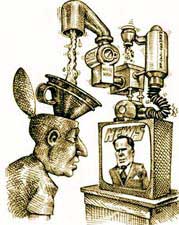
Charles Krauthammer
http://www.jewishworldreview.com -- NO ONE INVOKES the sanctity of the First Amendment more often and more passionately than the media. When music companies are criticized for purveying the most repulsive misogynistic rap lyrics, they hoist the First Amendment flag. When newspaper reporters who've given confidentiality pledges refuse to testify about their sources, the flag is run up again.
As it should be. For all its abuses, the First Amendment is perhaps the greatest of all bulwarks against the power of government. It turns out, however, that the TV networks are not quite the First Amendment purists they pretend to be. Dangle some cash in front of them and they will let the White House drug czar vet their scripts.
Salon magazine reported Jan. 13 that in return for being released from the obligation to show free anti-drug ads (and thus enabled to sell that ad time), the TV networks have allowed the White House to review prime-time programs to make sure they send the right anti-drug message.
These networks are parts of some of the same media giants that make passionate protestations of their sovereign right to purvey syncopated CD incitement to rape and murder. They are quite willing, however, to accept government meddling in their prime-time shows if that makes them money.
How much money? There's the howler. The six networks combined sold their First Amendment soul for a grand total of $25 million, about what Arnold Schwarzenegger gets for one movie. This for companies with combined revenues of about $5 billion.
It reminds me of that immortal line in "A Man for All Seasons" in which Sir Thomas More, condemned to death on the false testimony of his protege Richard Rich, sees him newly wearing the insignia of attorney general of Wales. "For Wales?" says More. "Why, Richard, it profits a man nothing to give his soul for the whole world. But for Wales!"
In reality, this ad-money-for-script-vetting swap is a novel form of product placement. Product placement is the practice of taking a bundle of cash from Coke in return for having the hero swig some prominently onscreen.
Disturbing as it is, gratuitously inserting a soda can or cereal box or muscle car into a scene for money is a trivial form of artistic corruption. However, inserting government-sponsored messages is not.
Unlike Coke and Kellogg, government has the power to tax, audit, subpoena, imprison. We allow companies and individuals and groups to put all kinds of pressure on media--through advertising, boycotts, lobbying. But we balk when government, with such unique and abusable power, steps in. In a system where liberty is preserved by the separation and diffusion of power, we rightly refuse to grant government even more power through control of the content of free media.
 |
One reason is to prevent slightly Orwellian press releases of the kind issued by the White House drug office on Jan. 14. It is headlined: "New Study Finds Little Depiction of Illicit Drugs on Network Prime Time Television: White House Drug Czar Pleased with Accurate Portrayals." He should be. He paid for them.
No big deal, you say. This whole affair involves nothing more than promoting anti-drug messages on prime-time shows. What's so wrong with that?
The big deal is not these particular ads but the principle: government's hand in mass media script-writing. If that is no big deal, what is to prevent government from doing it for other causes of its choosing?
President Clinton and his spokesmen were asked whether the vetting of scripts might not be extended to equally worthy messages about "gun control" and "youth violence" (and why not to recycling, ethnic tolerance, charitable giving and the correct use of the fork?). The response was not encouraging.
Press Secretary Joe Lockhart was defiant. We were "looking for other ways to get the [anti-drug] message out that allows networks in a robust advertising environment to sell to other people where they can make more money," he said.
Got a problem with that? Well, yes. Some find the practice corrupting. And when they asked Lockhart if it does not raise questions about deceptive government influence, he responded in perfect Clintonian fashion: "As far as sort of theological questions for the entertainment industry," said Lockhart, "I suggest you put the questions to the entertainment industry."
But of course. This is surely an airy abstraction for the likes of Thomas
Aquinas, on retainer at
Comment on Charles Krauthammer's column by clicking here.
01/14/00: Screwball Psychologizing
01/07/00: Desperately Seeking a legacy: Peace of the Anti-Semites
12/10/99: Born to Run
12/03/99: Keep Bubba home --- and his mouth shut
11/29/99: Not for Moi, Thanks
11/19/99: Where's the 2000 Buzz?
11/12/99: Reluctant Cold Warriors
11/08/99: Federalism's New Friends
10/29/99: The Phony Battle Against 'Isolationism'
10/25/99: Still With the Soul Of a Candidate
10/18/99: Nixon On the Couch
10/11/99: Slouching Toward The Center


